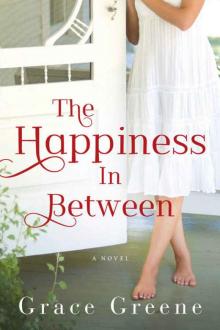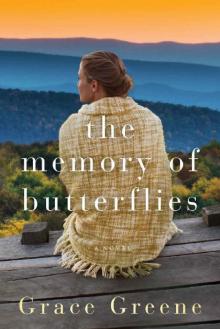- Home
- Grace Greene
The Memory of Butterflies: A Novel Page 9
The Memory of Butterflies: A Novel Read online
Page 9
“Maybe she’s still clearing debris herself,” Gran said. “Did you try calling her again?”
“Yes, Gran. Her phone’s still out.”
“Well, she hasn’t missed a visit in more than a decade. She’ll be showing up anytime now, I’m sure.”
I knew better. Something bad must’ve happened. As a dedicated nurse and a family friend, she would’ve found some way to get here when she realized she couldn’t call us. I’d been worried about how to explain our own grief to her, fearful the fault for our loss would fall on me due to something I’d done or not done. And yet, I’d also wanted her counsel. Gran had gone back to dozing. I’d never felt so alone.
When the groceries were delivered for the first time post-storm, we didn’t answer the door. I’d hung a note on the door telling Eva to leave the goods on the porch. When I went to the window and peeked around the curtain, I saw it was her son, Anthony. I rushed out to the porch and caught him before he reached the truck.
“Oh, hey there, Hannah. Need any help?”
“No, we’re good.”
“Lost a tree, I see.” He pointed at the branches and leaves still littering the ground, and at the most obvious part, the trunk.
I nodded. “We did.”
“It was a mess all around.”
For a moment, I had a brief flare of hope that maybe the extent of the storm damage across the area explained Mildred’s absence, but then Anthony spoke again.
“Did you hear about Mildred Harkin?”
“No,” I whispered.
“I’m sorry to be the one to tell you. She had a heart attack during the storm.”
My lips parted as I intended to say something, even to just echo his words, but nothing came out.
“Apparently she was attempting to pull some branches off her car and keeled over. Must’ve had somewhere to go that couldn’t wait. Her neighbor found her shortly after the rain ended, but it was too late.” He gave the yard another look. “If you need any help, let us know.”
I’d forgotten about the wood, but Anthony noticed.
“You want someone to take that wood? I know a fella who’ll split it, take some, and leave you some. Want me to have him call?”
“Sure. That would be great.”
He left. I carried the grocery box inside and set it on the kitchen table. What would I say to Gran? Too many losses. How could we bear them? Would the county send a new nurse? Mildred’s loss was a sign—a sign to keep my own counsel because with Mildred gone, there was no one with whom I could discuss what had happened to us. Selfishly, I found a small, warm comfort imagining Mildred had likely accompanied Ellen, had seen her safely arrived to where I would someday greet her again.
Thereafter, we always left the note on the door for grocery deliveries. Eva came a couple of times and put the box on the porch. The first time, she stared at the door and the note for long minutes before leaving. Eventually, she stopped coming, and Anthony took over full time, and he had more interesting things on his mind than our personal business.
The only person who ever asked after my baby was George Bridger, and that was no doubt because he was being polite, not really being a baby sort of person and not knowing of our loss. I walked away. He joined Gran for a cup of coffee, and she must’ve told him about our grief because he never asked again. He always looked at me a bit askance after that, as if he thought he’d angered me and didn’t want to risk ticking me off again. Or maybe he was afraid my grief might be catching or would demand some sort of response from him. He was a lonely man and didn’t interact much, but I let him go on thinking it. So long as he didn’t ask me questions.
The propane deliveryman was the only other person who came out during that time, and he’d never known about Ellen or the pregnancy. Aside from George Bridger, no one knew about our loss, and I wanted to keep it that way. As long as it wasn’t official, there was still some part of her alive in my heart. The world, if it knew, would ask questions and make judgments and force me to speak of it. As far as I could tell, Gran hadn’t told the man in Mineral who paid our tax bills and whatnot. In my head, he was a kind of clerk with a long beard and angel wings who wore a brown suit. Brown, I guess, because she’d called him Mr. Browne, and wearing angel wings because he sent us money from time to time. And the long beard? Maybe because he seemed like Santa sending us gifts of money.
We saw few people. After Mr. Bridger’s last encounter with me, he didn’t wander in as often, and I began to feel badly about it.
In February, on the day when Ellen would’ve turned one, I stayed in bed until Gran started poking at me with her cane. I expected her to cater to my right to be miserable and grieve. I saw by her face that she, too, was grieving, but today I couldn’t help her. I obeyed her cane but went outside and spent the warmest part of the day in the pottery cabin. I hadn’t been in here since I’d lost my baby girl. It was too cold to work the clay, but I did anyway. Not on the wheel but on the table. I sculpted a small child. The figure was rough. Before I was done, my heart failed me, and I left it unfinished, knowing that meant it could never be fired or glazed. It would be a simple dried clay form, subject to breakage with the least jostle. Fragile.
I washed my hands at the outside pump. The cold water set me to shivering and drenched my shoes. I went back inside, still not speaking to Gran, and started a hot bath to thaw myself out. My hands had cracked from the cold air and wet clay, and they were bleeding. Later, I noticed I must’ve been crying because raw, chapped tracks marked my flesh from my eyes to my neck.
After the first anniversary, and especially once spring began to peek in on us, life began to feel normal again. Not as it had been before our loss, but survivable.
Over the years, when Gran had been in a baking mood, I’d take a walk up the hill and deliver a pie to Mr. Bridger. I decided it was overdue. Gran wasn’t up to baking, but she supervised while I put together a cobbler with the peaches Eva’s son had delivered in the grocery box. When the cobbler was done baking and cool enough to carry, I took a walk up and over Elk Ridge. It was already September. I’d survived the anniversary of Ellen’s birth in February and also the anniversary of us losing her, and I could see promise ahead, distantly, barely present on the horizon but there. That had to be enough for right now. I crossed the high point of the ridge and came out of the woods and emerged in Bridger’s old fields. I followed the overgrown farm road through the fields. He rarely farmed anymore, but stuff grew anyway—stuff the butterflies liked. As I walked, a bunch of them rose in an orange cloud. I paused and watched them flutter around me. A couple came close to my face and hair. One landed on the top of the dish I was holding. I stood still, waiting, then blew on it softly. The butterfly fluttered its wings and floated away. But it had lifted my spirits.
I found Mr. Bridger sitting on his porch in a cane chair. He’d rocked it back onto its hind legs and balanced with his boots propped on a box. His firearm was set alongside the chair. He was sipping tea with perhaps a little extra in it and smoking a cigar. The left side of the porch was loaded with boxes and all manner of stuff, including some tools, and had a noticeable sag at that end. Above us, though, the Bridger house rose two stories and had once been known for its beauty. Not a huge house but a substantial one, and not kept up. It was slowly disintegrating.
“You look peaceful, Mr. Bridger.”
“I am. You’ve brought me something, I see.”
“Peach cobbler.”
He dropped his feet to the porch, and the chair clunked forward. “That’s real nice of you. Tell Clara I appreciate it.”
“I did the cooking. Gran’s recipe, of course.”
“Double thanks to you, then.” He stubbed out his cigar. “Maybe my boy, Liam, will be here in time to have some.”
“You heard from Liam? That’s good.”
Mr. Bridger was an odd character, even with my limited knowledge of human beings. He wasn’t natural with people. His son was older than me and had rarely been around when I was gr
owing up. I’d seen him a few times, of course, being neighbors of sorts, and he was a good-looking guy, as I recalled. Rough but handsome with a bad-boy reputation. He’d left the area long ago, and no one had seen him around here in years. It was hard on old Mr. Bridger, but I didn’t doubt it must’ve been hard on his son, too, growing up with him, and that likely accounted for his decision to make himself scarce as soon as he was old enough.
“Is he coming to stay or just for a visit?”
“Stay awhile, I reckon. It was his wife who called. She rang me on the phone and said they were coming.”
I couldn’t imagine what they’d think of this house. I’d heard it was a beauty years ago, one of the nicest in this area back when his great-grands had built it. When I was a child, I’d been fascinated with the gingerbread fretwork on the porch, the fancy woodworked door, but most of all by the stained glass windows on the second floor. Butterfly panels, Gran called them, because of the side panels. I learned in high school art history that the set of three panels was called a triptych. In the last several years, the house had continued to go down, and that was from the vantage point of the outside. I’d never been inside.
Did Mr. Bridger realize how this place would look to an outsider? One thing I’d learned when I started going to school in town, especially by the time I hit middle school, was that a person’s brain grew used to seeing their surroundings in a certain way and didn’t realize how it looked to others. That front window upstairs, stained glass panels with lilies and butterflies in pieces of glass in brown and blue and gold and red, was a marvel. I would’ve loved to see it from the inside, so it might be worth the price of offering my help. Gran always said he had lots of money but you’d never know it, and he wouldn’t be likely to pay me for the work. Still, he was a neighbor.
“You need any help getting things ready?” I asked. “I could give you a hand.”
His expression was scornful. He probably picked up on my lack of sincerity.
I looked down and shuffled my feet, then reminded myself I was an adult. “Shall I put the cobbler in the kitchen?”
“You can set it right there on that box. I’ll enjoy smelling it. I’ll take it in when I go.”
“All right, then.” I set the dish on the upturned crate he’d been using as a footrest.
“How’s Clara doing?” he asked.
“Well enough, considering. She’s got the sniffles, though. I hope it doesn’t settle into a cold.” It nagged at me, my own hard-heartedness toward this old man. “Are you sure you’re good here getting ready for company and all? I can spare some time.”
“I’m fine. I can manage on my own, no problem. Give Clara my regards.”
Sometimes people dwelled on things, especially if they were alone too much. I suspected George Bridger couldn’t get past that one rebuff when he’d asked about my Ellen, and he held it against me. Or maybe he tried to steer clear of emotional women, especially those who’d proven themselves to be predisposed to rude and emotional reactions.
“You take care, Mr. Bridger. Have a good visit with your family.”
I didn’t give Mr. Bridger another thought. Gran was having a lot of troubles. Mildred had been wiser than I knew. Herbal teas, warm poultices on her legs—I tried everything I could think of to help her, but when I mentioned seeing a doctor, she’d get mulish and wouldn’t discuss it. A new visiting nurse came by, and I let her in, but she was a stranger, and Gran was grumpy. We were both missing Mildred.
Suddenly, it was November and snow was falling. It didn’t linger on the ground too long, but it heralded a snowy winter, and I rarely left our cozy Hollow. I kept the fire burning in the woodstove, and the propane kept the kitchen stove operating. Even if we lost the electricity, we’d be able to manage—not preferred but doable.
I brought my good clay inside lest it freeze and did some sculpting on the kitchen table. Gran liked to watch. I was sculpting another child. This one, I thought, would be better than the first that still sat, unfinished, on a shelf in the cabin. I pressed a sliver of clay onto the shoulder and smoothed the edges in carefully. When I was satisfied, I sat back and met Gran’s eyes.
“Sure you don’t want to take a turn at it?”
She laughed softly. “Me? Been much too long. Lost the knack of it many years ago. Besides, it was always the wheel for me anyway.”
“You taught me.”
“My mama taught me. One of these days I’m going to take a walk out back to the old cabin and see their pieces again. That pottery is the work of three generations of hands.”
“But not my mother’s hands.”
She shook her head. The good nature spilled right off her face into sadness.
“Sorry, Gran.”
“No harm. Just what it is. But she never had a feel for it. Your mama was never one to sit still.”
It was rare that Gran volunteered any reminiscence about my mother. I looked up, hopeful, thinking she might say more, but she didn’t. The subject veered away from dangerous emotional areas. Perhaps if I’d felt the lack of parents more keenly I would’ve pushed harder, but whatever caused hurt to my Gran hurt me nearly as much, and so, as always, I let it go.
“Hannah, honey. Are you running out of shelf space in the shed? Do you have what you need out there? Heaven knows I haven’t been out there in years. The days do slip away.”
Seeing an imperfect spot, I pushed another tiny wedge of clay into place on the back. Then I looked up and smiled at her. “The shelves are getting pretty full, but there’s space left.”
“One of these days I’m going to walk out there and see what you’ve made. You are wonderfully gifted, Hannah. What are you going to do with it all?”
I shrugged. “Give it away, I guess. Maybe try selling some of it.”
Gran leaned forward, reaching for her cane. “That won’t work hiding away out here in Cooper’s Hollow.”
“Then it’s not time yet. That’s all I know.”
“Get a shop in town. You’d be good at that, Hannah.”
“Gran, please.”
“Or how about a roadside stand? Right out by the state road? Instead of tomatoes, sell your clay pots.”
I looked up. She was grinning. I smiled back and said, “We’ll set you up there with your rocker and your cane, shall we? You can be the one to talk to all those strangers.”
That quieted her. After a while she spoke again.
“What about college?”
I focused on the clay and didn’t respond. She didn’t press me but got to her feet and, between touching the wall for stability and using the cane for support, she made her way back to the bathroom.
Gran was feeling better than she had in a while. I ordered turkey dinners to be delivered. Eva’s son did the delivery, and I met him at the porch. Come Christmas, I thawed out a venison roast an old friend of Grand’s had brought us. We celebrated in our quiet way. I’d never gone back to cleaning houses, nor did I try to find another job. I’d lost the desire to go to college or even to leave. Gran and I did very well on our own. Happy didn’t really figure into it. We settled for contentment, and we were careful not to upset the emotional balance we’d worked hard to achieve.
February was difficult, and as if by prior discussion, Gran left me alone on what would’ve been my daughter’s second birthday. I cooked for Gran, but otherwise we spent the day apart.
Spring arrived prematurely in early March. My thoughts turned to my garden. I felt like making plans for planting. I made a shopping list and tried to estimate how much it would cost. Gran called the man in town while I was out in the cabin. When I came back inside, she asked me to go to the bank in Mineral where money was waiting for us. From there I could go on into Louisa, a little farther than Mineral but larger, as it was the main town in Louisa County, and make my purchases. I did. It felt odd walking into the bank and speaking to the branch manager, but he checked my driver’s license and handed me cash with a smile.
In April, I prepared the bed, but
Gran allowed no outside planting before May because one hard frost would end the new growth before it had hardly began.
On a sunshiny morning in early May, the air changed. It felt genuine. Life was stirring. I felt it in myself, too, and after I’d cleared away the breakfast dishes, I made a batch of cookies. While I was baking, I heard a noise, like a brisk knock on the front door. I listened, but it didn’t repeat, so I pulled out the last sheet of cookies to cool. Gran ate a couple while they were hot, and I didn’t fuss at her. Instead, I kissed her on the forehead and left her to it. It was shortly before noon when I stepped out onto the porch expecting to see a broken branch laying on the porch planks, or perhaps an injured bird that had flown into the door.
There was no branch. No bird. Only a little girl, a toddler between two or three years old, sitting in my rocking chair. Her feet didn’t reach the floor but hung there clad in some sort of plastic slip-on shoes, and they dangled above the wooden planks. Her dark-brown hair brushed her shoulders. A blue barrette held her bangs back. The barrette had slid halfway down, and her hair didn’t look clean. She was wearing a blue quilted jacket, stained, and long pants, and a skirt, to boot. She looked bulky, so she was likely wearing extra shirts, too. She was silent and didn’t move.
This child, this vision, stilled my heart. For a long minute, I held my breath. I thought I’d finally gone all the way over.
Is this how crazy happens? One moment you were good, or thought you were, and the next, you were living in a land to which no one else had general admittance. You lived each day thinking you were managing, handling your life, and then one bright morning, when you least expected it, a hallucination laid you out flat.

 Wildflower Hope (The Wildflower House)
Wildflower Hope (The Wildflower House) The Happiness in Between
The Happiness in Between The Memory of Butterflies: A Novel
The Memory of Butterflies: A Novel Clair (Beach Brides Book 4)
Clair (Beach Brides Book 4)